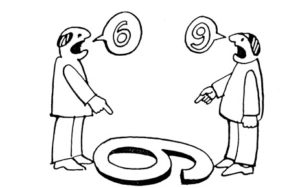-
Being Open Minded And Self-Reflective
-
Seeing Things From Someone Else's Perspective
- An Introduction To Empathy
- Quiz 4
- What’s More Important? Being Nice Or Being Right?
- Celebrating Our Differences
- Compassion Versus Logic
- Science Versus Religion
- Examples of Showing Empathy 1
- Examples of Showing Empathy 2
- Examples of Showing Empathy 3
- Examples of Showing Empathy 4
- The Power of Understanding
- Assignment 3: Constructing A Journal Entry
-
Creating My Own Framework For Demonstrating Empathy
-
Creating Our Own Framework For Demonstrating Empathy
An Introduction To Empathy
 Undoubtedly you have heard the word “empathy” before! It is kind of a catch phrase right now. Like “paradigm shift,” or “synergy.” It is one of those terms that we throw around a lot when we want to sound like we are smart, and like we are doing our part to incentivize thinking outside of the box about core competencies, in order to drill down and amplify… sigh…
Undoubtedly you have heard the word “empathy” before! It is kind of a catch phrase right now. Like “paradigm shift,” or “synergy.” It is one of those terms that we throw around a lot when we want to sound like we are smart, and like we are doing our part to incentivize thinking outside of the box about core competencies, in order to drill down and amplify… sigh…
Sorry. I got carried away with buzz words!
Besides being a fancy term that makes us sound like a good person, what is empathy?
Empathy means seeing things from the perspective of other people. Which can be very challenging. I was recently walking in the hallway with a very tall friend and a very short friend. The tall friend was admiring the view through the windows of each room that we passed, and commenting on what he saw inside the rooms. While all that the short friend could see were the bricks of the wall in the hallway.
 It may be difficult for the tall person to see the hallway from the perspective of the short person and equally difficult for the short person to see the hallway from the tall person’s perspective. Yet, both perspectives represent someone’s genuine reality. Both perspectives are valid. Neither is more or less true than the other.
It may be difficult for the tall person to see the hallway from the perspective of the short person and equally difficult for the short person to see the hallway from the tall person’s perspective. Yet, both perspectives represent someone’s genuine reality. Both perspectives are valid. Neither is more or less true than the other.
Empathy is about more than just seeing things from another person’s perspective though. It is also about feeling and understanding. In the case of my two friends, true empathy would require my tall friend to not only crouch down, but to also pause and reflect on what it must be like to walk through the hallway being so short. To feel the emotions that the short friend feels when they can’t see what is inside all the rooms we pass, but have to hear the descriptions being given by the tall friend. Likewise, empathy would require my short friend to appreciate what the world must be like to a tall person… always hitting their head on things…
Empathy Is About Validating The Experiences of Others
It is recognizing that we all have different talents. What is easy for us, may be genuinely difficult for someone else. Why is this important? Imagine that a friend accomplishes something that they are very proud of. Something that took them a lot of work and effort to do. Perhaps this something is very easy for you. Maybe it is something that you can do in your sleep… while eating a cheeseburger… with both hands tied behind your back… while also juggling live kittens… (too far?)
Anyway, imagine how your friend would feel if after they waited all day to tell you about their accomplishment, you just brush them off, as though what they did was no big deal. Here they were looking forward to sharing their accomplishment with you. They value you so much, that they literally sought you out so that you could share their sense of joy with them. And what do you do? You brush them aside, because in your mind, that accomplishment is nothing to write home about.
Then there is the reverse. Suppose that a friend really struggles with a particular problem. It could be anything. But for the sake of argument let’s say that it’s losing socks in the dryer. Let’s imagine that every time your friend loses a sock in the dryer, they break down into tears, and have an anxiety attack. To them, this is a big deal! To them, losing one sock leaves the other one all alone in the Universe! Now destined to be single and lonely forever! THAT POOR SOCK!!! Okay, so to you, it may be silly, but… how you feel isn’t the point. Empathy is about seeing things from someone else’s perspective!
It is about celebrating with others, using their perspective to gauge your response. It is about mourning with and comforting others, using their perspective as a barometer for how sad they feel. Empathy means putting your own measuring tape away, and using theirs. Empathy has very little to do with your state of being, your success, your strengths or weaknesses, and everything to do with recognizing the world from the perspective of the other person.
None of us have the same talents. What is easy for you, may be difficult for them, but guess what! Undoubtedly there are things that are easy for them, but that are difficult for you. Who are you going to turn to in your time of need? Do you want them to make fun of you for being so bad at something that is so easy for them?
Validate Others By Recognizing Where They Are
We all start out as infants. Naked and clueless! From there we begin down a thousand different roads. Some of us proceed down one path, and some of us down another. In elementary school some of us become really good at drawing, and some of us become really good at eating paper… or at playing basketball. Or any number of other things. By the time we are adults, we have all mastered a variety of skills, but none of us have mastered everything.
Empathy is about recognizing where others are, feeling their frustrations based on where they are, and celebrating their victories based on where they are.

